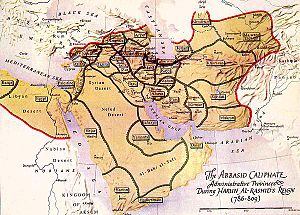786
Appearance
| Millennium: | 1st millennium |
|---|---|
| Centuries: | |
| Decades: | |
| Years: |
| 786 by topic |
|---|
| Leaders |
| Categories |
| Gregorian calendar | 786 DCCLXXXVI |
| Ab urbe condita | 1539 |
| Armenian calendar | 235 ԹՎ ՄԼԵ |
| Assyrian calendar | 5536 |
| Balinese saka calendar | 707–708 |
| Bengali calendar | 193 |
| Berber calendar | 1736 |
| Buddhist calendar | 1330 |
| Burmese calendar | 148 |
| Byzantine calendar | 6294–6295 |
| Chinese calendar | Ất sửuNiên (WoodOx) 3483 or 3276 — to — Bính dần niên (FireTiger) 3484 or 3277 |
| Coptic calendar | 502–503 |
| Discordian calendar | 1952 |
| Ethiopian calendar | 778–779 |
| Hebrew calendar | 4546–4547 |
| Hindu calendars | |
| -Vikram Samvat | 842–843 |
| -Shaka Samvat | 707–708 |
| -Kali Yuga | 3886–3887 |
| Holocene calendar | 10786 |
| Iranian calendar | 164–165 |
| Islamic calendar | 169–170 |
| Japanese calendar | Enryaku5 ( diên lịch 5 niên ) |
| Javanese calendar | 681–682 |
| Julian calendar | 786 DCCLXXXVI |
| Korean calendar | 3119 |
| Minguo calendar | 1126 beforeROC Dân tiền 1126 niên |
| Nanakshahi calendar | −682 |
| Seleucid era | 1097/1098AG |
| Thai solar calendar | 1328–1329 |
| Tibetan calendar | Âm mộc ngưu niên (female Wood-Ox) 912 or 531 or −241 — to — Dương hỏa hổ niên (male Fire-Tiger) 913 or 532 or −240 |

Year786(DCCLXXXVI) was acommon year starting on Sundayof theJulian calendar,the 786th year of theCommon Era(CE) andAnno Domini(AD) designations, the 786th year of the1st millennium,the 86th year of the8th century,and the 7th year of the780sdecade. The denomination 786 for this year has been used since the early medieval period, when theAnno Dominicalendar erabecame the prevalent method in Europe for naming years.
Events
[edit]By place
[edit]Europe
[edit]- KingCharles the Younger,son ofCharlemagneand ruler ofAquitaine,visitsMonte CassinoandCapua,both inBeneventanterritory. PrinceArechis II,feeling threatened by the Franks, decides that he needs to stop quarrelling with the ByzantineDuchy of Naplesso he can focus on the Frankish foe. Prince Arechis II therefore signs a peace agreement, or 'pactum', with the Duchy of Naples.
Britain
[edit]- Cyneheard,brother of the late kingSigeberht,ambushes and kills his rivalCynewulf of Wessex,while he is atMeretun(now calledMarten) with his mistress. The Wessexnoblesrefuse to recognise Cyneheard as king.
- Cyneheard is executed and succeeded byBeorhtric,through the support of KingOffa of Mercia.His rival claimant to theWessexthrone, a distant nephew of the late kingIne,namedEgbert,is driven across theChannel.
- Egbert settles at the court of Charlemagne, and learns the arts of government during his time inGaul.[1]During his stay he meetsEadberht,apriest,who later becomes king ofKent.
Abbasid Caliphate
[edit]- June 11–Battle of Fakhkh:AnAliduprising inMedinais crushed by theAbbasids.One of the Alids,Idris ibn Abdallah,flees to theMaghrebin western North Africa, where he later founds theIdrisid dynasty[2]in 788/789.
- September 14–Harun al-Rashidbecomes the AbbasidcaliphinBaghdad,upon the death of his brotherAl-Hadi.He appoints Salim Yunisi as governor ofSindhand theIndus Valley.
By topic
[edit]Religion
[edit]- Beatus of Liébana,monk andtheologian,publishes hisCommentary on the Apocalypse.
Births
[edit]- October 10–Saga,emperor of Japan (d.842)
- Adelochus,archbishop ofStrasbourg(d.823)
- Al-Ḥajjāj ibn Yūsuf ibn Maṭar,Muslim mathematician (d.833)
- Al-Ma'mun,Muslimcaliph(d. 833)
- Sahl ibn Bishr,Muslimastrologer(approximate date)
- Tachibana no Kachiko,empress of Japan (d.850)
Deaths
[edit]- June 11–Al-Husayn ibn Ali al-Abid,anti-Abbasid rebel leader[2]
- September 14–Al-Hadi,Muslim caliph (b.764)
- September –Marajil,mother of caliph al-Ma'mun.
- October 16–Lullus,archbishop ofMainz
- Abo of Tiflis,Christianmartyr
- Al-Rabi' ibn Yunus,Muslim minister (or785)
- Cyneheard the Ætheling,nobleman ofWessex
- Cynewulf,king of Wessex
- Desiderius,king of theLombards(approximate date)
- Diarmait mac Conaing,king of SouthBrega(Ireland)
- Sakanoue no Karitamaro,Japanese general (b.727)
- Tipraiti mac Taidg,king ofConnacht(Ireland)
- Empress Wang (Dezong)of China
References
[edit]- ^Kirby,Earliest English Kings,pp. 176-177.
- ^abVeccia Vaglieri, L.(1971)."al-Ḥusayn b. ʿAlī, Ṣāḥib Fak̲h̲k̲h̲".InLewis, B.;Ménage, V. L.;Pellat, Ch.&Schacht, J.(eds.).The Encyclopaedia of Islam, Second Edition.Volume III:H–Iram.Leiden: E. J. Brill. pp. 615–617.doi:10.1163/1573-3912_islam_SIM_2979.OCLC495469525.
